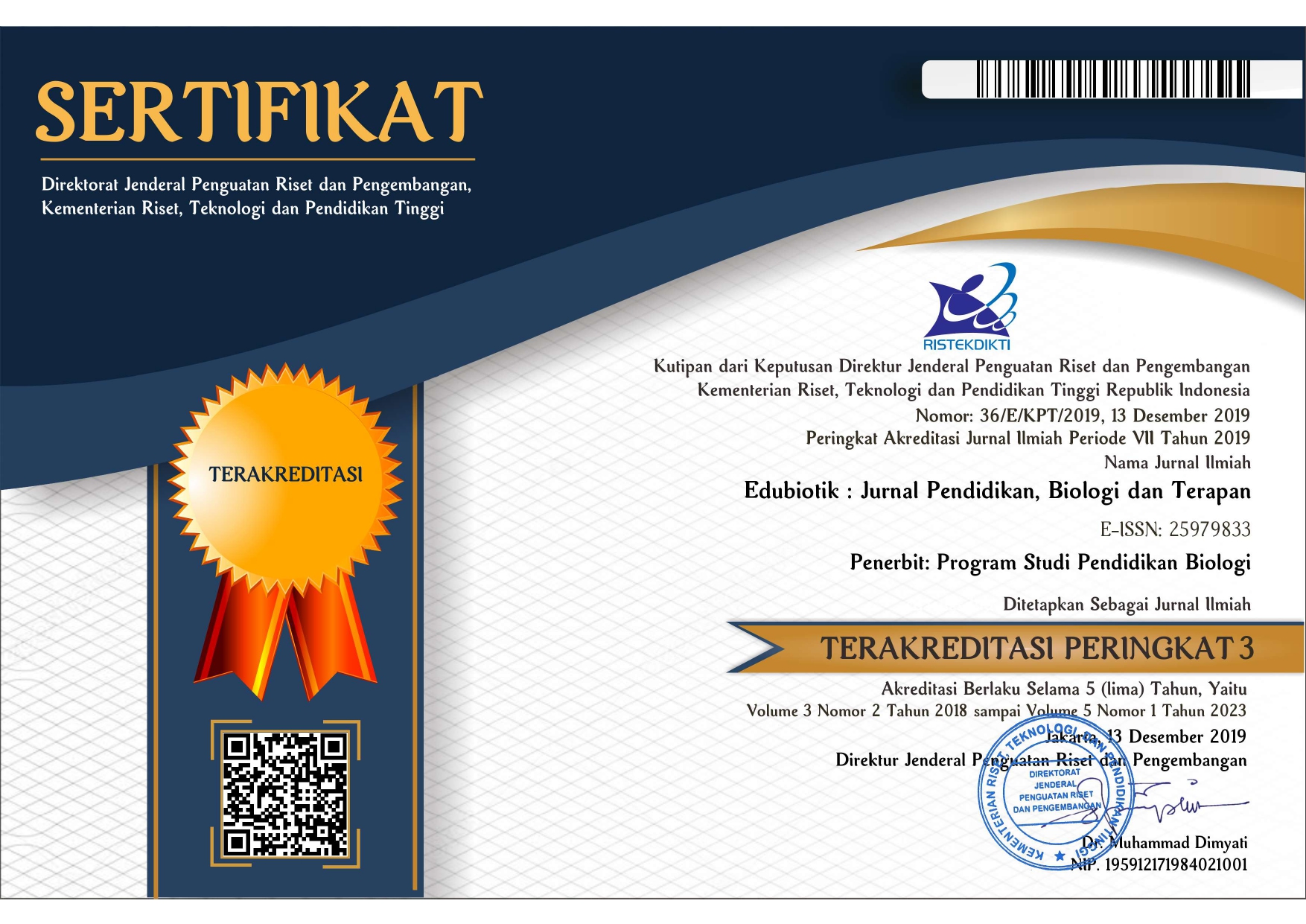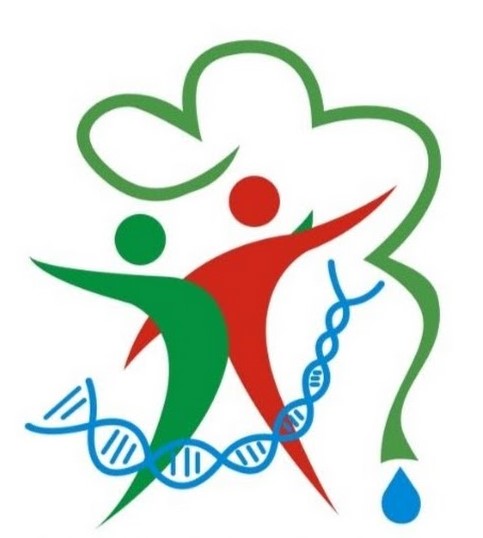Perbandingan tingkat efikasi siswa dalam menyelesaikan soal genetika ditinjau dari keikutsertaan bimbingan belajar
Abstract
Academic self-efficacy of students makes students confident and confident in their ability to solve genetic problems correctly. The purpose of this study is to compare the level of academic efficacy of students who take tutoring with students who do not take tutoring in solving genetic problems. The research method used, namely quantitative comparative research. The study population was students of class XII in Majalengka Regency. The sample consisted of 240 students who were divided into two groups, namely participant and non-participant tutoring. The research instrument used a questionnaire consisting of 74 items that have been declared valid and reliable statements. Data analysis using two independent sample t-test techniques. The results showed that the comparison of the level of academic efficacy of students in solving genetic problems in terms of participation in tutoring showed a significant difference (p <0.05). Participants tended to have higher levels of academic efficacy on all dimensions of academic efficacy, namely level, strength, and generality compared to non-participants. The conclusion of this study was that there were differences in levels of academic efficacy between students who took tutoring and did not.
References
Ainscough, L., Foulis, E. Colthorpe, K., Zimbardi, K., Robertson-Dean, M. Chunduri, P., & Lluka, L. Changes In Biology Self Efficacy During A First-Year University Course. “The American Society for Cell Biology”. https://doi.org/10.1187/cbe.15-04-0092
Alegre, Alberto A. (2014). Academic Self-Efficacy, Self Regulated Learning And Academic Performance In First-Year Uuniversity Students. Propositos y Representationes, 2 (1), hlm. 79-120. Retrieved from https://files.eric.ed.gov/fulltext/EJ1135321.pdf
Ates, H. & Saylan, A. (2015). Investigation Of Preservice Science Teachers’ Academic Self Efficacy And Academic Motivation Toward Biology. International Journal of Higher Education, Vol. 4 (3), hlm. 90-103. Retrieved from https://eric.ed.gov/?id=EJ1088751
Atta, M. A., Jamil, A., Rehman, J., Ayaz, M., Saeed, A., & Shah, M.A. (2011). Effect Of Private Home Tuition On Educational Attainments Of Students At Secondary School Level. World Applied Sciences Journal, Vol. 13 (6) : 1486-1492. Retrieved from https://www.researchgate.net/journal/1991-6426_World_Applied_Sciences_Journal
Bahar, M., Johnstone, A.H. & Hansell, M. H. (2012). Revisiting Learning Difficulties In Biology. Journal of Biological Education, 33 (2). https://doi.org/10.1088/00219266.1999.9655648
Bandura, A. (1997). Self-efficacy: The Exercise Of Control. New York: W.H. Freeman and Company. Retrieved from https://psycnet.apa.org/record/1997-08589-000
Chen, G., Gully, S.M & Eden, D. (2001). Validation Of A New General Self Efficacy Scale. Organizational Research Methods, 4 (1), 62-68. https://doi.org/10.1177%2F109442810141004
Çimer, Atilla. (2012). What Makes Biology Learning Difficult And Effective: Students’ Views. Educational Research and Reviews, Vol. 7, (3): hlm. 61-71. Retrieved from https://academicjournals.org/article/article1379665422_Cimer.pdf
Çimer, Osman., Gokmen, Mahmet. Altunsoy, Sultan, Ekici, Gulay., Yilmaz, Mehmet, (2011). Analysis Candidate Teachers’ Self-Efficacy Beliefs On Environmental Education. Procedia Social and Behavioral Sciences, Vol. 15, 2549-2553. https://doi.org/10.1016/j.sbspro.2011.04.143
Cooper, Eric. (2010). Tutoring Centre Effectiveness : The Effect Of Drop-In Tutoring. Journal of College Reading and Learning, Vol. 40 (2) : 21-34. Retrieved from https://files.eric.ed.gov/fulltext/EJ887303.pdf
Direktorat Pembinaan Kursus dan Pelatihan, Kementerian Pendidikan dan Kebudayaan. (2018). Data Dan Informasi Lembaga Kursus Dan Pelatihan. Retrieved from https://kursus.kemdikbud.go.id/index.php/download/data-dan-informasi-kursus-dan-pelatihan-tahun-2018/
Duda, Hilarius J. (2016). Analysis Of Genetic Misconceptions Student Biology Education At STKIP Persada Khatulistiwa Sintang. International Conference On Education. Graduate. Education in the 21th Century : Responding to Current Issue. School Univeristas Negeri Malang. hlm 369-375. Retrieved from https://www.semanticscholar.org/paper/Analysis-of-Genetic-Misconceptions-Student-Biology-Duda/10c100312bdcb0ab4fbcb90076c805aa371e4092
Ekici, G., Fettahlioglu, P., & Sert-Çibik, A. (2012). Biology Self Efficacy Beliefs Of Students Studying In Department Of Biology And Department Of Biology Teaching. International Online Journal of Educational Science (IOJES), Vol. 4 (1), hlm. 39-49. Retrieved from http://www.oalib.com/paper/2781845#.Xi5b608zbIV
Eriany, Praharesti. (2014). Studi Deskriptif Mengenai Faktor-Faktor Yang Mempengaruhi Motivasi Mengikuti Kegiatan Bimbingan Belajar Pada Siswa SMP Di Semarang. Jurnal Psikodimensia, Vol. 13(1) : 115 – 130. https://doi.org/10.24167/psiko.v13i1.282
Gabriel-Millette, Christie. (2016). The Effect Of Tutoring On Academic Performance. Research, Planning & Institutional Effectiveness. Valley College, hlm. 1-4. https://doi.org/10.7821/naer.2017.7.201
Guill, K. Ludtke, O. Koller, O. (2019). Assessing The Instructional Quality Of Private Tutoring And Its Effects On Student Outcomes : Analyses From The German National Educational Panel Study. British Journal of Educational Psychology, hlm.1-19. https://doi.org/10.1111/bjep.12281
Hikmawati, V.Y., Rustaman, N. Y., and Saefudin, S. (2014). Efektivitas SQ5R Terhadap Pengetahuan Konseptual Dan Retensi Siswa Pada Pembelajaran Sistem Reproduksi Manusia. Jurnal Pengajaran MIPA, Vol. 19 (2), hlm. 199-205. Retrieved from http://journal.fpmipa.upi.edu/index.php/jpmipa/article/view/461/pdf_13
Kuan, P. Y. (2011). Effect Of Cram Scholling On Mathematics Performance : Evidence From Junior High School Students. Journal of Educational Research, 98, hlm. 115-126. https://doi.org/10.3200/JOER.98.2.115
Sahito, Zafarullah., Khawaja, M., Siddiqui, A., Shaheen, A. and Saeed, H. (2017). Role Of Tuition Centres In The Performance And Achievement Of Students : A Case Of Hyderabad District, Sindh, Pakistan. Journal of Education and Training Studies. Vol. 5 (4). Retrieved from https://files.eric.ed.gov/fulltext/EJ1133883.pdf
Suleman, Qaiser.Hussain,Ishtiaq. (2014). Effect Of Private Tuition On The Academic Achievement Of Secondary School Students In Subject Mathematics In Kohat Division, Pakistan. Journal of Education and Learning. Vol. 8 (1), hlm. 29- 40. Retrieved from https://pdfs.semanticscholar.org/60ae/125628fd8fb3f2ef135a2ecbbaf31ddc5dd2.pdf
Wernersbach, Brenna M., Crowley, Susan L., Bates, Scott C., and Rosenthal, Carol. (2014). Study Skills Course Impact On Academic Self-Efficacy. Journal of Developmental Education. Vol. 37 (3), hlm. 14-33. [Online]. Tersedia : Retrieved from https://files.eric.ed.gov/fulltext/EJ1070256.pdf





.png)
2.png)

1.jpg)


